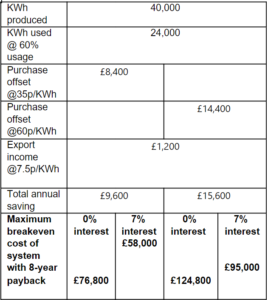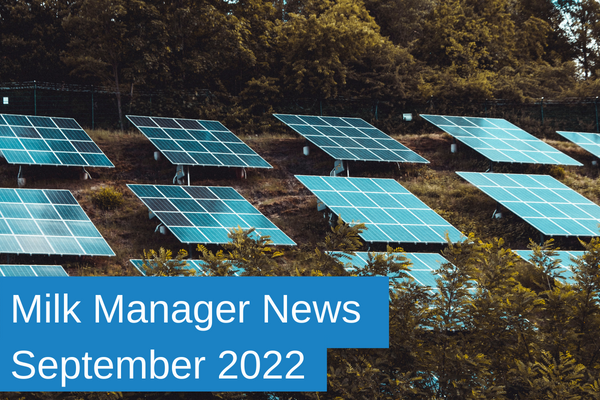Milk Manager News September 2022 – Solar Panels
13 September 2022Although new Feed in Tariff (F.I.T.) agreements have not been available for some time, the lower cost and higher efficiency of modern solar panels make them more attractive. The sudden spike in electricity prices has also made payback times a lot shorter. There are a number of things to consider before investing in a solar system.
As an example, consider a 50kw (kilowatt, rated power output) solar system. This has the potential to produce at least 40,000kwh (kilowatt hours, energy produced) of electricity annually, depending on location. At 35p a unit, this could offset the purchase of £14,000 of electricity per year. As existing contracts are renewed, this figure is likely to rise.
However, if the system is mounted on an east/west facing roof, rather than south facing, expect a drop in performance of between 15-20%. It is also unlikely that all this electricity will be used on farm, especially if time of peak generation does not match time of peak use. In a high use situation, such as some dairies or grain drying units, use of generated power can be up to 80% (although, this would be a maximum figure).
Battery storage is available but not proven. It is likely that this technology will improve and become cheaper with time. If hot water is required on farm, the use of insulated water cylinders with an electric immersion heater is also a way to make use of peak electricity generation.
Any electricity not used has to be purchased by your energy provider under the government’s Smart Energy Guarantee. If there is a large amount of extra electricity generated and, crucially, grid capacity is available, a better price can be negotiated.
To further encourage energy efficiency, Scottish businesses can apply for an SME loan. This is an interest-free loan of up to £100,00 with an 8-year payback. This can be used for various energy efficiency and renewable energy measures. There is also cashback available on some measures. Those most relevant to agriculture include LED lighting and “variable rate drives”. Variable speed milk, or vacuum pumps may fall into the latter category. However, solar panels do not qualify for cashback.
As a condition of the loan, an energy efficiency assessment must be undertaken. This should be applied for before the loan.
https://businessenergyscotland.org/support-scottish-businesses/
The assessment has no charge and will involve a farm visit by the assessor. Lead times to get the assessment done appear to be lengthening, which would indicate an increase in demand.
Several banks are offering incentives for loans for energy efficiency projects. These include foregoing an arrangement fee or offering a percentage cashback on the value of the loan.
The table below shows the break-even cost of a 50kw system installed with loan assistance and with an interest-bearing loan.
Costs associated with a 50kw solar system
The energy efficiency assessment uses a figure of around £10,000 per 10kw as an investment cost. Generally, as the size of the system increases, the cost per kw decreases.
Although this shows the break-even costs over eight years, panels are expected to last 25 years, with little maintenance other than keeping them clean. Inverters are likely to need replacing within this time.
The financial viability of a solar system will depend on how much of the electricity produced can be used on farm. Before considering installation, it would be useful to assess exactly how much power is used, and when. In-line meters that will record on an hourly basis can be installed, although temporary meters are also available. These can be put in place for up to six weeks to give an energy use profile. This can be compared with daylight hours to estimate likely usage of any potential electricity produced.
Although the electricity bill is not usually the highest on farm cost, the size of increases has been staggering. With such volatility, it may be a good time to look at locking in some of your electricity costs.
alasdair.scott@sac.co.uk; 01555 662562
Sign up to the FAS newsletter
Receive updates on news, events and publications from Scotland’s Farm Advisory Service


